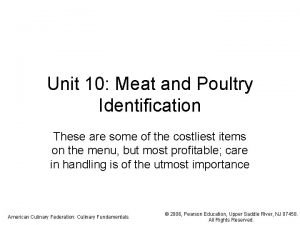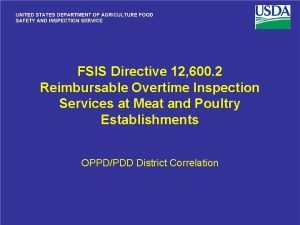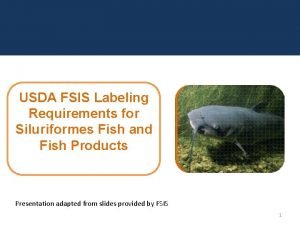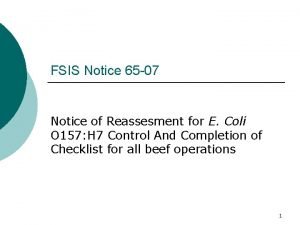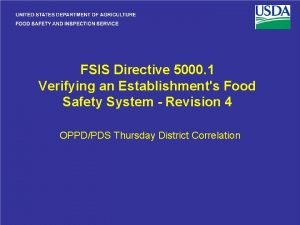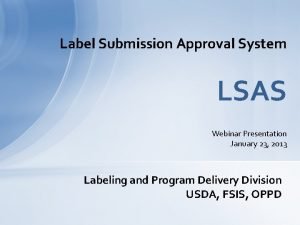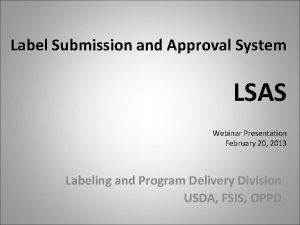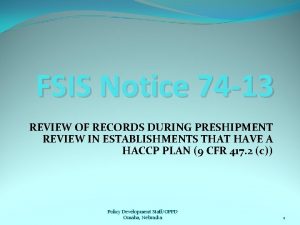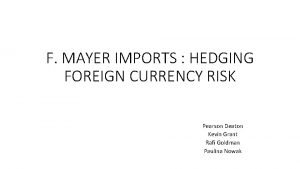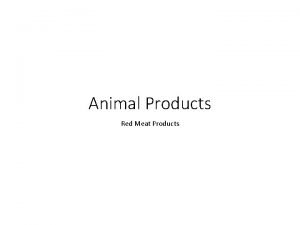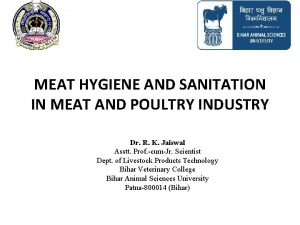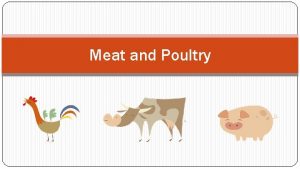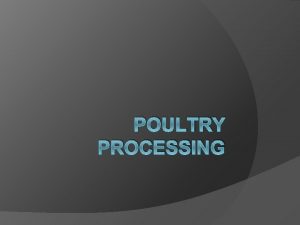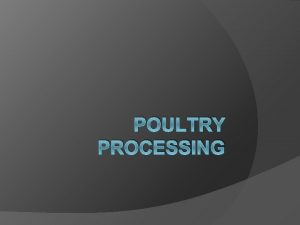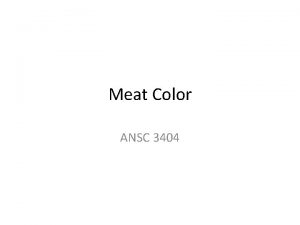Managing Meat Poultry and Egg Products Imports FSIS





















- Slides: 21

Managing Meat, Poultry and Egg Products Imports

FSIS Regulated Imports § In FY 2006, the United States imported 3. 9 billion pounds of meat and poultry products from 29 eligible foreign countries and 5. 9 million pounds of egg products from Canada 20% 22% Other Australia 12% New Zealand 46% Canada 14% Processed Meat 2% Fresh Poultry 84% Fresh Red Meat

FSIS Regulated Imports Egg products imports: 60 percent Pasteurized n Liquid n Frozen 38. 5 percent Unpasteurized n Liquid n Frozen 1. 5 percent Dried

Entry into the United States n n n Imported meat, poultry, and egg products must satisfy the requirements of two USDA agencies before entering U. S. commerce. One: Animal disease controls enforced by the Animal and Plant Health Inspection Service (APHIS). Two: Food safety/public health controls enforced by the Food Safety and Inspection Service (FSIS)

FSIS Control of Imported Product FSIS has three mechanisms of control for imports: n Foreign countries must be determined eligible to export to the U. S. -- meat, poultry, and egg products intended for human consumption must satisfy APHIS animal disease requirements and may be imported only from eligible countries as determined by FSIS n Foreign establishments must be certified n Port-of-entry reinspection of all import shipments

Entry into the United States Food and Drug Administration (FDA) q q FDA is responsible for seafood, fruits and vegetables, and denatured animal products not intended for human food. FDA regulates some processed products containing small amounts (less than 3 percent) of meat and poultry exempt from FSIS regulation.

Entry Into the United States n Importer of record files entry with U. S. Customs and Border Protection (CBP) n CBP completes agriculture checks for restricted products (per APHIS requirements) n Releases shipment to FSIS for reinspection (public health requirements)

Entry Into the United States q q Importers are required to post a “bond", usually an amount to cover the value of the shipment plus duties and fees. Shipments remain under bond and subject to redelivery by CBP until FSIS releases the shipment. www. cbp. gov

FSIS Control of Imported Product n n 74 Import Inspectors stationed at 33 major ports verify every shipment meets USDA/FSIS requirements Product Examinations q n Review foreign establishment certification, health certificate and other required documentation; review for product damage and general condition; ensure proper labeling; and verify box count Laboratory Examinations q Microbiological contamination, residues (veterinary drugs & pesticides), food chemistry, species identification, pathology, and biological threat agents

FSIS Control of Imported Product FSIS must take enforcement action when: n n Importers fail to present eligible meat, poultry, and egg products for inspection after their release by CBP When imported product shipments arrive at U. S. ports of entry from ineligible sources When imported product fails inspection and is refused entry When uninspected or ineligible imported product is discovered in domestic commerce

FSIS Import Enforcement - ISLOs n FSIS’ 22 Import Surveillance Liaison Officers (ISLOs) are focused on enforcement at port-of-entry n ISLOs coordinate cargo monitoring activities with CBP, APHIS, FDA, and the National Fish and Wildlife Service (NFWS), as well as with importers and brokers. n The goal of import surveillance is to find, investigate, and control noncompliant imported products moving in domestic commerce. n FSIS maintains an Import Alert database to track the monitoring and control of noncompliant product.

FSIS Control of Imported Product Reasons for Import Alerts n Adulterated Product n Failure to Present for FSIS Inspection n Ineligible Product n Shipments controlled by other agencies n U. S. returned product

International Data System (ITDS) FSIS Import. Trade Initiatives n Electronically links all Federal agencies with import regulatory responsibility to CBP’s Automated Commercial Environment (ACE) q Participating Government Agency (PGA) since 2003 q Safe Ports Act makes ITDS integration mandatory q

International Data System (ITDS) FSIS Import. Trade Initiatives n n has provided portal access to ACE FSIS import personnel query ACE and target suspicious consignments to help identify: Potential ineligible or smuggled shipments q Shipments that fail to present for import reinspection prior to entering commerce q

FSIS Control of Imported Products Through the ACE Portal, FSIS secured real-time access to shipment entry summary data previously obtained from CBP only through printed reports received up to 45 days after entries were filed: n n n n Customs Entry Number Entry Line Entry Date Entry Type Description Unit of Measure and Quantity Port-of-Entry code Port-of-Entry name Country of Origin HTS Code HTS Description Importer Name Importer of Record number Filer Name Filer Code Consignee Name

FSIS Control of Imported Products Using ACE entry data, FSIS can determine: n If shipments have entered from ineligible countries or establishments n Ports-of-entry of noncompliant shipments n Importer of Record and Consignee for noncompliant shipments n Detention or redelivery actions taken by CBP

FSIS Import Enforcement n As a result ACE Portal access, between FY 2005 and FY 2006, the amount of ineligible product detected, detained, and removed from commerce and the food chain by FSIS increased 44 fold -from 36, 000 to 1. 6 million pounds. n During the first 6 months of FY 2007, FSIS controlled 1. 5 million pounds of ineligible product.

Future ACE Benefits n n n ACE portal access is a bridge to a permanent electronic interface between CBP and FSIS. ACE facilitates import commerce by reducing the paperwork burden associated with FSISregulated imported product. FSIS inspectors spend less time on data entry; more time inspecting and clearing shipments.

Future FSIS Initiatives Automated Export-Import Information System (AEIIS) n n n Will provide platform for two-way interface with ACE Ability for FSIS to transmit (export) and receive (import) electronic certificates between foreign inspection systems Electronic certificate data used to verify shipment entry data filed in ACE

References FSIS International Web Site http: //www. fsis. usda. gov/OPPDE/IPS/ Import Manual of Procedures http: //www. fsis. usda. gov/OPPDE/op/IIM/TOCIIM. htm

Contact Information Robert T. Tuverson FSIS Office of International Affairs Import-Export Program Staff (202) 690 -3981 importexport@fsis. usda. gov
 Market form of beef
Market form of beef Poultry meat hygiene and inspection
Poultry meat hygiene and inspection Different market forms of meat
Different market forms of meat Fsis overtime directive
Fsis overtime directive Fsis lsas
Fsis lsas Fsis notice 34 21
Fsis notice 34 21 Fsis directives
Fsis directives Lsas fsis
Lsas fsis Lsas usda
Lsas usda 74+13
74+13 Imports and exports
Imports and exports Chick embryo 72 hours
Chick embryo 72 hours Belgravia imports
Belgravia imports Visible trade
Visible trade Irish food imports
Irish food imports F mayer imports
F mayer imports Giuliana imports
Giuliana imports Risol imports ltd
Risol imports ltd Np import
Np import Cbif
Cbif Great gatsby nick appearance
Great gatsby nick appearance East egg vs west egg
East egg vs west egg


